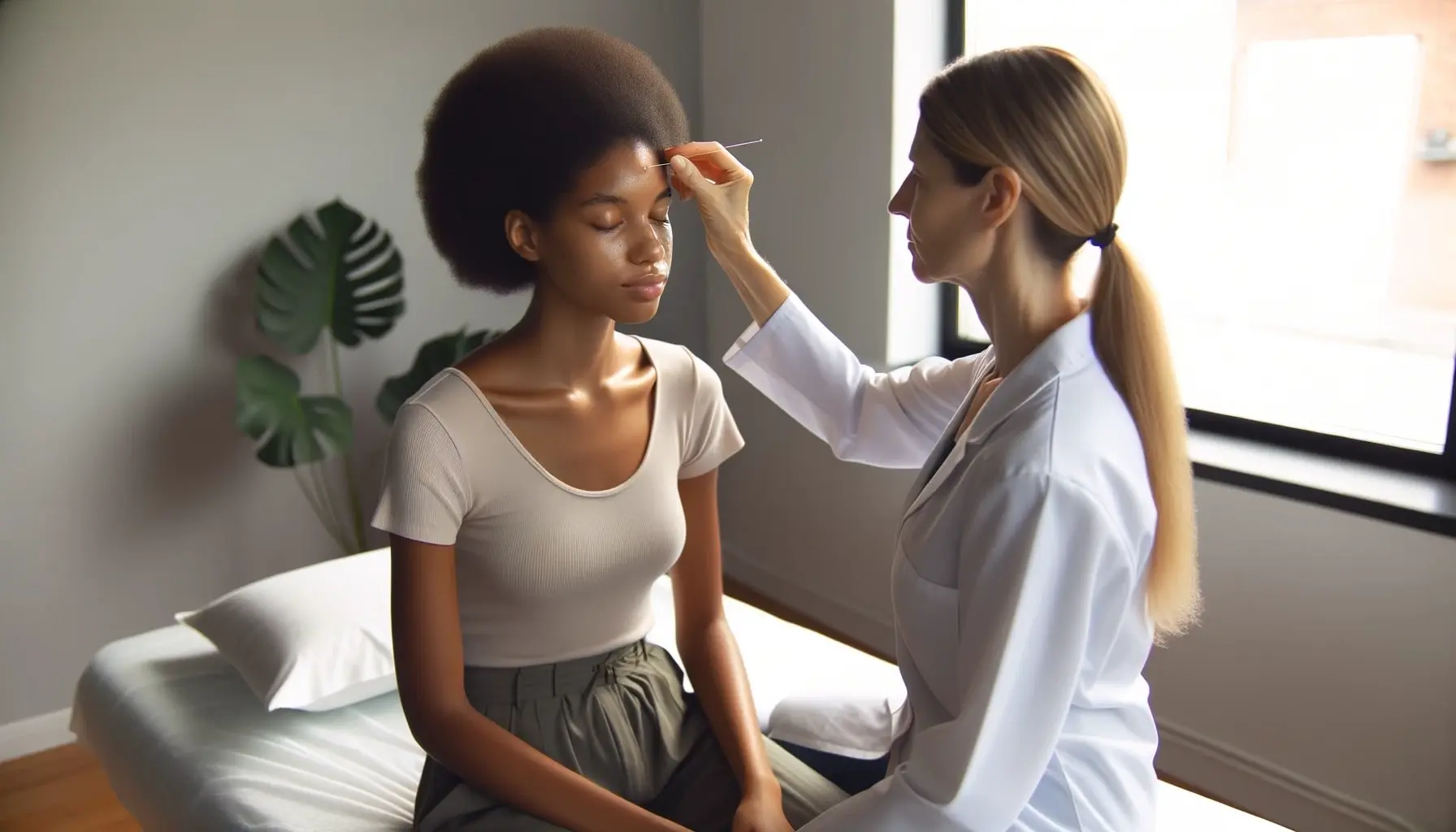Acupuncture, a gem from the treasure trove of traditional Chinese medicine, has traversed through millennia, offering relief and healing for a myriad of health conditions. This intricate art of healing involves the strategic placement of slender needles at precise points on the human body, aiming to rekindle the flow of energy, or ‘qi’.
Over time, the West has embraced acupuncture, integrating it as a complementary therapy to address a spectrum of health issues. In this explorative journey, we delve into the essence of acupuncture, unraveling its potential and its pivotal role in the realm of holistic health.
Decoding Acupuncture
Acupuncture stands as a testament to the resilience and wisdom of ancient Chinese medicine. Its roots delve deep into a time-honored tradition that perceives the body as an intricate network of energy pathways, known as meridians. The disruption of energy flow within these meridians is believed to be the progenitor of pain and illness. Acupuncture, therefore, is the art of restoring balance, aiming to rejuvenate the flow of ‘qi’ and kickstart the body’s innate healing mechanisms.
In a world that’s constantly searching for holistic and non-invasive healing modalities, acupuncture has emerged as a beacon of hope. It transcends the boundaries of conventional medicine, offering a unique perspective on health and wellness. It’s a dance of precision and balance, where thin needles pave the way for energy to flow freely, promising relief and restoration.
The Science Behind the Needles: How Acupuncture Pierces Through Illness
The needles used in acupuncture are far from ordinary. They are exceptionally thin, yet hold the power to tap into the body’s energy reservoirs. When these needles make contact with specific points on the body, they act as conduits, reestablishing the flow of ‘qi’. This isn’t just a poetic description of an ancient practice; modern science has begun to peel back the layers, uncovering the mechanisms that make acupuncture a potent therapy.
Research has demonstrated acupuncture’s efficacy in addressing chronic pain, a prevalent ailment that often eludes the grasp of conventional medicine. By targeting specific points associated with pain and discomfort, acupuncture offers a beacon of relief, guiding the body back to a state of balance and ease. As we delve deeper into the world of acupuncture, we uncover its multifaceted role in addressing mental health conditions, digestive issues, and even infertility.
Acupuncture and Chronic Pain: A Ray of Hope
The battle against chronic pain is a strenuous journey, fraught with challenges and setbacks. Acupuncture emerges as a formidable ally in this fight, offering a holistic approach to pain management. Numerous studies, including one highlighted by Harvard Medical School, underscore the potential of acupuncture in alleviating chronic pain, particularly in the realms of back pain, neck pain, and osteoarthritis.
By integrating acupuncture into one’s holistic health regimen, there’s a beacon of hope that shines, promising not just relief, but a journey back to wellness and balance. This is the power of acupuncture; it’s not just a treatment, but a journey through time, culture, and healing, offering a holistic embrace of health and wellness.
How Acupuncture Works
The intricacies of acupuncture extend beyond the simple insertion of needles; it’s an art backed by intricate theories and a rich history. Acupuncture’s efficacy is rooted in its ability to stimulate the body’s natural healing mechanisms, promoting a holistic balance between physical and mental well-being.

The Science Behind the Needles
Modern research has begun to shed light on how acupuncture works from a scientific perspective. Studies suggest that the insertion of needles at specific acupuncture points stimulates the release of endorphins, the body’s natural painkillers, and affects areas of the brain involved in processing pain. Moreover, acupuncture has been observed to alter brain chemistry by changing the release of neurotransmitters and neurohormones, which play a crucial role in influencing the body’s homeostatic mechanisms.
Incorporating findings from the National Institutes of Health, acupuncture has been recognized as a viable method to treat various types of pain, further solidifying its standing in the medical community. These findings reinforce the notion that acupuncture is more than just placebo; it’s a legitimate therapeutic modality.
Acupuncture and the Flow of Qi
Traditional Chinese Medicine (TCM) posits that acupuncture works by restoring balance and ensuring the smooth flow of Qi (life energy) throughout the body. According to TCM, Qi circulates through meridians, and disruptions in this flow can lead to disease and discomfort. Acupuncture seeks to correct these imbalances, facilitating the body’s natural healing response.
Meridians and Acupuncture Points
The body is believed to have twelve main meridians connected to specific organs and systems. Each meridian is associated with different acupuncture points, serving as conduits for Qi. The precise selection of these points is paramount, as it determines the treatment’s effectiveness.
The Holistic Approach: Acupuncture in Contemporary Healthcare
Acupuncture’s rise in popularity in Western medicine is indicative of a broader shift towards integrative healthcare, recognizing the value of combining conventional and alternative therapies.
Acupuncture as Complementary Therapy
Many health professionals are now recommending acupuncture as a complementary therapy alongside conventional treatments. This integrative approach aims to address not just the symptoms, but the root causes of conditions, promoting a comprehensive healing process.
Case Studies and Clinical Trials
Numerous case studies and clinical trials have been conducted to validate acupuncture’s effectiveness. The Harvard Medical School has provided insights into acupuncture's role in pain management, highlighting its potential in treating chronic pain conditions. And now point acupuncture main francais works according to the latest studies.
Acupuncture’s Role in Preventive Medicine
Beyond treating existing conditions, acupuncture is gaining recognition for its role in preventive medicine. Regular acupuncture sessions are believed to enhance the immune system, increase energy levels, and contribute to overall well-being, laying a strong foundation for long-term health.
Stress Reduction and Mental Clarity
Acupuncture’s benefits extend to mental health, helping to reduce stress and improve mental clarity. By promoting relaxation and alleviating anxiety, acupuncture contributes to a balanced state of mind, integral to holistic health.
Practical Advice and Future Prospects
As acupuncture continues to gain popularity and credibility in the world of modern medicine, many individuals are considering this ancient practice as a viable option for their health and wellness journey. This final section of the blog provides practical advice for those looking to explore acupuncture, as well as a glimpse into the future prospects of this holistic healing modality.
Finding the Right Practitioner
One of the most crucial steps in starting your acupuncture journey is finding a qualified and experienced practitioner. Look for a licensed acupuncturist who has undergone extensive training and holds certifications from reputable institutions. Don’t hesitate to ask about their experience, particularly in treating conditions similar to yours. Recommendations from friends, family, or your primary healthcare provider can also be invaluable in finding a trustworthy practitioner.

Setting Realistic Expectations
It’s important to approach acupuncture with an open mind and realistic expectations. While many individuals experience significant benefits from acupuncture, results can vary, and it may take several sessions before noticeable improvements occur. Being patient and committed to the process is key.
Looking Ahead: The Future of Acupuncture
As research continues to unravel the mechanisms behind acupuncture’s effectiveness, we can expect this practice to become an even more integral part of integrative healthcare.
Integration with Conventional Medicine
The future of acupuncture lies in its integration with conventional medicine. By combining the strengths of both Eastern and Western medical practices, patients can receive a more comprehensive and holistic approach to their health and well-being. So acupuncture in France works.
Technological Advancements and Innovation
Advancements in technology are also playing a role in the evolution of acupuncture. From needleless acupuncture to the use of laser therapy, innovations are making acupuncture more accessible and comfortable for patients.
Global Recognition and Accessibility
As acupuncture gains global recognition, efforts are being made to increase its accessibility. This includes training more practitioners, expanding insurance coverage, and raising awareness about the benefits of acupuncture.
Acupuncture offers a unique and holistic approach to health, bridging the gap between traditional and modern medicine. Whether you are seeking relief from chronic pain, looking to improve your mental well-being, or simply aiming to enhance your overall health, acupuncture presents a promising and ancient avenue worth exploring. Embracing this practice could be the key to unlocking a balanced and harmonious state of health, now and in the future.

 Bonjour! I am Mathieu Lefebvre, I am a French national taking medicine in the United States. I took a great interest in alternative medicine since they are very prevalent here in the United States than in my native country! Though they are not really taught in our school that extensively, I find myself learning about them for the sake of knowledge!
Bonjour! I am Mathieu Lefebvre, I am a French national taking medicine in the United States. I took a great interest in alternative medicine since they are very prevalent here in the United States than in my native country! Though they are not really taught in our school that extensively, I find myself learning about them for the sake of knowledge!